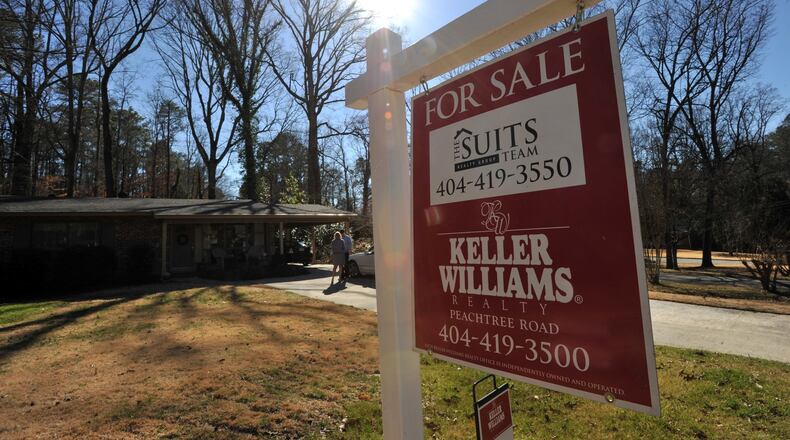WHY IT MATTERS
Home sales and values are important even to people who aren’t likely to sell or buy anytime soon. The state of the housing market contributes to the so-called “wealth effect” that helps drive the broader economy by making people more confident about purchases of all types.
Homes sold
The number of homes sold in metro Atlanta dropped from the year before, a return to the sluggishness seen in the fall as inventory stayed low. January figures are preliminary.
Month…..Total sales…..Year-over-year percent change
May…..4,600…..up 5.5
June…..4,351…..up 7
July…..4,623…..up 9.5
August…..4,268…..down 1.2
September…..3,594…..down 0.9
October…..3,613…..down 5.3
November…..3,103…..down 9
December…..3,429…..up 2.9
January…..2,400…..down 10.6
Sales prices
The median sales price of metro Atlanta homes is up substantially over the previous year.
Month…..Median price…..Year-over-year percent change increase
May…..$200,000…..39.9
June…..$215,000…..6.3
July…..$217,000…..47.1
August…..$205,675…..38.5
September…..$189,000…..35
October…..$189,704…..5.5
November…..$181,000…..20.7
December…..$196,000…..21
January…..$180,000…..22.4
Source: Atlanta Board of Realtors
Home sales in metro Atlanta fell in January, pushed down by a low number of homes on the market and rough winter weather than kept shoppers at home.
The median sale price increased, however, and experts say the spring season should be busy as rising values prod more sellers to put houses on the market.
Sales volume has slipped in several recent months for the same reasons, but the January decline was steeper and reversed a small year-over-year gain in December.
January sales fell 10.6 percent from January 2013, and 30 percent from December, according to data from the Atlanta Board of Realtors.
The median sale price rose 22.4 percent year over year to $180,000, buoyed by the low inventory overall and reduction in foreclosed houses on the market.
“Lack of supply drives prices up,” said John Hunt, a senior analyst with real estate analysis firm Smart Numbers. “It leads to lower sales, when there’s nothing to buy.”
The stubborn lack of inventory could be good news for homebuilders, who should expect more demand for new homes, Hunt said. It also bodes well for the spring selling season, which is expected to be even better than last year’s frenzied pace.
Collette McDonald, a Realtor with RE/MAX, said two snow and ice storms and a blast of frigid weather that preceded them put the brakes on a season that was already picking up. In December, sales rose 2.9 percent from a year earlier, ending a four-month string of small declines.
“Buyers don’t go out when there are other things they’re worried about,” she said. “If we can’t drive around buyers, if buyers aren’t motivated to be outside, we won’t be able to sell.”
McDonald said she has already seen more interest, and more offers, with better weather in the past week.
Todd Emerson, president of the Atlanta Board of Realtors, said February sales may still be slow, but he expects the spring to pick up quickly.
“2014 is going to be a better year than 2013, when all’s said and done,” he said.
Companies continue to relocate to Atlanta, said Jana Waycaster, an assistant managing broker with Berkshire Hathaway Home Services in Braselton. That brings new buyers and makes her optimistic about the typical homebuying season.
McDonald, with RE/MAX, said people feel more comfortable with the economy. She said she continues to see multiple offers on homes, and she expects listings to rise as those who were unable to finish pre-listing projects due to the bad weather are able to get their houses ready to sell.
But McDonald said buyers are discerning. Last year, she said, sellers were pricing houses with the concern they wouldn’t sell. That meant some houses that weren’t in great condition sold because they were priced below the market.
As prices rise and people have greater expectation of a quick sale, “they’re going to have to step up their game if they want multiple offers,” McDonald said. “They’re not going to be able to put (poor properties) on the marketplace.”
“It’s going to be a brisk, great market, but it’s not going to be as frenzied as 2013,” she said. “Demand is still very high. Supply is so low. It will naturally pick up.”
Hunt, with Smart Numbers, said he expects that to happen, too. But, he warned, it has been a long time since the U.S. has experienced a housing market like this one.
The long, deep recession might have changed homeowners’ views on mobility and trading up for more space or features.
“Six years of this changes the way people think about their situations, whether they need to move at all,” he said. “Some of the reasons to move no longer apply.”
About the Author
The Latest
Featured



